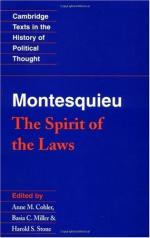|
This section contains 10,143 words (approx. 34 pages at 300 words per page) |

|
SOURCE: Gilbert, Alan. “‘Internal Restlessness’: Individuality, and Community in Montesquieu,” Political Theory 22, 1 (1994): 45-70.
In this essay, Gilbert draws out the ethical bases of Montesquieu's philosophy, linking his sense of moral justice to his vision of a liberal, interdependent society. Gilbert focuses on Montesquieu's use of the English model to flesh out his interpretation of Montesquieu's ideal commercial state.
1. Two Interpretations of Montesquieu
In Spirit of the Laws, Montesquieu began his argument with a striking contrast of the virtue-based politics of ancient small warrior republics and the honor-based politics of large eighteenth-century monarchies. He invoked a novel, general social theory of the nature, principle and complex spirit of such regimes (the latter knits together climate, geography, customs [moeurs], manners [manières], religion, education, sources of wealth, and laws as they affect each major aspect of social life).1 But that theory suggests important moral and political discontinuities; it might even...
|
This section contains 10,143 words (approx. 34 pages at 300 words per page) |

|


